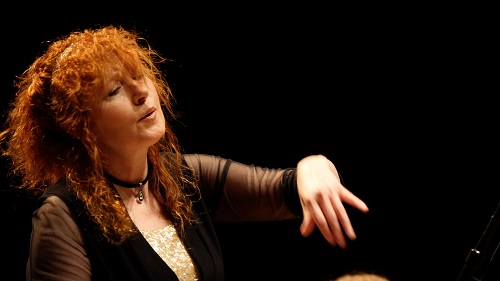 United States Handel, Messiah: Sonya Headlam, Erica Schuller (sopranos), Amanda Crider (mezzo-soprano), Steven Caldicott Wilson (tenor), Edward Vogel (baritone), Apollo’s Singers, Apollo’s Fire / Jeannette Sorrell (conductor). St. Paul’s Episcopal Church, Akron, Ohio, 8.12.2022. (MSJ)
United States Handel, Messiah: Sonya Headlam, Erica Schuller (sopranos), Amanda Crider (mezzo-soprano), Steven Caldicott Wilson (tenor), Edward Vogel (baritone), Apollo’s Singers, Apollo’s Fire / Jeannette Sorrell (conductor). St. Paul’s Episcopal Church, Akron, Ohio, 8.12.2022. (MSJ)

All too many performances of Handel’s Messiah consist of a comfortable amble through the early Christmas-y numbers in Part I, a dutiful slog through Part II until (finally!) the ‘Hallelujah Chorus’ arrives, then back to dutiful slog for Part III. One of the greatest affirmations one could give a performance is if it doesn’t have that shapelessness. As Jeannette Sorrell has demonstrated in her renditions of Monteverdi’s Vespers, having a mastery of the long arc of a work can change how it comes across in performance.
In this Apollo’s Fire concert, Sorrell made it clear that the ‘Hallelujah’ is not the climax of the work. Rather, it is a sudden release of tension after the climactic darkness which precedes it in Part II. She made sure the depiction of Jesus’s rejection had dramatic punch in two interesting ways. First, instead of using a singer with a silvery voice for ‘He was despised’, she cast mezzo-soprano Amanda Crider in the part. Crider has an earthier tone, which put less emphasis on the quietly despairing phrases that hang out in the silences and more emphasis on the turbulent middle section.
After that, Sorrell set loose tenor Steven Caldicott Wilson in his most dramatic manner while the sopranos and basses of Apollo’s Singers left the stage and filed along the side aisles of the church. Wilson could thus sing ‘All they that see him laugh him to scorn’ in an accusatory manner directly at the surrounding singers, with the highest and lowest voices answering him in the following chorus in a scathing blast of sound. For the audience, it was like being caught in a deadly enfilade in the middle of a battlefield, and it made hairs on the back of one’s neck stand on end.
By correctly shaping Part II, Sorrell’s ‘Hallelujah Chorus’ was rousing, but its dominant emotion was one of relief, throwing the true climax toward the end of the piece, powering listeners through Part III into a masterly rendition of the long closing chorus, ‘Worthy is the lamb’. Again, that’s a chorus that is often botched by low energy and lack of shape, but Sorrell made it a microcosm of the entire work, starting with gentle lyricism, passing through a variety of moods that propel it to the closing pages which seem to open up the gates of heaven themselves, putting the famous ‘Hallelujah Chorus’ in perspective as just another step on the stairway to heaven.
I heard a solid performance of Messiah a few years ago with Dame Janet Glover leading the Cleveland Orchestra and Chorus. She did a similar thing, animating the less familiar parts of the work to great effect, but she took the most famous first part as a holiday classic not to be messed with. Sorrell had no such deference, treating this year’s performance as a new study of the work, with new discoveries and inflections even in the familiar parts. Such reinvention helped her find dramatic emphasis in ‘And He shall purify’, making it the second part of the one-two punch following the fast ‘refiner’s fire’ sections of ‘But who may abide’. Speaking of that solo, baritone Edward Vogel was animated and commanding in his arias, including a searching ‘The people that walked in darkness’, abetted by a dimming of the house lights in the preceding chorus and followed by a brightening when he sang ‘upon them hath the light shined’.
Erica Schuller’s silvery soprano enchanted in several numbers and floated in ‘I know that my redeemer liveth’, a number than can turn mawkish if not lifted with airy phrasing. Soprano Sonya Headlam displayed an intriguingly contrasting voice. To call it ‘golden’ would hint at the warmth and luster of her tone, yet there was also something breathy and earthy about it that made her opening ‘Comfort ye’ truly welcoming, and the following ‘Ev’ry valley’ joyous.
The chorus, Apollo’s Singers, was crisp and vigorous, while the orchestra gave strong support. Especially delightful was the moment when I glanced over at the anchor of the basso continuo, double bass player Sue Yelanjian, during Vogel’s performance of the aria ‘Why do the nations’. Yelanjian has no doubt played Messiah so many times that she could do it in her sleep. But instead of being bored, she was watching Vogel take flight with a grin of delight on her face. It’s a good example of what makes the ensemble special. In a strictly musicological sense, Yelanjian didn’t have to be invested in the soloist’s success, but she absolutely was because that’s how this group makes music. And that kind of energy, that kind of commitment, makes all the difference in the world.
Violinists Olivier Brault and Susanna Perry Gilmore had lovely solo moments, and natural trumpet player Steven Marquardt gleamed in ‘The trumpet shall sound’. Indeed, one of Sorrell’s continuing keys to success in this thirty-first season of Apollo’s Fire is that she can find and weld together the strengths of such a varied cast of elite period performers and make it something greater than the sum of its already considerable parts. That she can do it with such a seasoned chestnut as Messiah, making every moment as engaging as it must have been to its first audience, is little short of a Christmas miracle. The capacity audience at St. Paul’s Episcopal Church recognized it and responded joyously.
Mark Sebastian Jordan